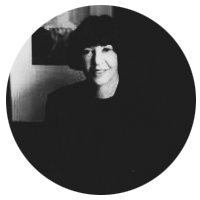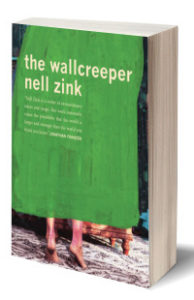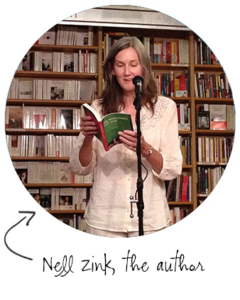Yes, it was a wretched winter.
But the polar temperatures and alpine snow piles allowed me to stay at home guilt free and chores be damned, curl up under the extra quilt and read. Besides which, some of the books I read helped me keep warm. Because they were hot. I don’t mean porno. I mean they were the kind of literary works that have some heat and sizzle. I read four such novels this winter. All four were written by women, one of them a debut novelist, the others well established in their native countries of England and Canada but little known in the U.S.—a provincialism on our part that is being rectified  by the publication here of their sparkling new works.
by the publication here of their sparkling new works.
Over four weeks, I’m introducing you to each of the books.


THE WALLCREEPER
by Nell Zink
Dorothy, A Publishing Project. 193 pp.
It’s not often one comes across a novelist with a voice as offbeat and altogether original as Nell Zink’s. She writes as if she’s fencing — her sentences feint, thrust, parry, leap, and time after time take a jab that goes right to its target: your gut. She’s been writing for years, but what she wrote was what she calls “impromptus,” communications which she merely sent to friends –“long involved things,” she says, “like Viennese-style operettas and entire novels just to illustrate points in conversation.
It was only at the urging of one of those friends, her fellow bird lover, Jonathan Franzen, that she wrote the first draft of The Wallcreeper; its life began as an impromptu for him. I don’t buy the impromptu thing. Zink’s paragraphs may move with the zing of sudden thoughts, but the sentences have been chiseled, the words curated. Here she is on spotting cranes: “They were sock puppets with red heels.” And here she is on seeing geese: “They passed overhead in so many Vs that they merged into Xs and covered the entire sky like a fishnet stocking.”
Did I say that she’s not just good at descriptions, but she’s hilariously funny? Here’s Zink on marriage:
“Marriage isn’t a sacrament. It’s just a bunch of forms to fill out.” And here she is on pregnancy – it’s “one of those things that happen when newlyweds get drunk.”
Her narrator, Tiffany, is a newlywed. Working at a low-level typing job in a pharmaceutical company, she latches on to Stephen, a scientist at the company who has just received an offer for a better position in Europe. After a three-week courtship, the pair marries – Stephen because he doesn’t want to be in Europe all on his lonesome, and Tiffany because she believes having a man to be dependent on will bring her happiness. Alas, it doesn’t work out quite that way. For one thing, Stephen wants things she doesn’t want. Like sex standing up in the kitchen only three weeks after she’s had a miscarriage and her “down there” has not yet healed.
“I was there in a state of mournful passivity while he knelt down and licked me,” Zink writes, “touching my asshole rhythmically with one finger and petting my thigh in counterpoint. I felt sad. His awkward hands reminded me of the flames around Joan of Arc at the stake.”
Still, that’s not the worst of it. Tiffany thinks maybe she’ll feel better about the encounter once they progress to intercourse. “However, that was before he entered my butt with the rest of his hand followed by his penis and the metaphoric auto-da-fe became a thick one-to-one description of taking a dump.” Stephen comes, “crying out like a dinosaur,” after which Tiffany falls out of love with him, having discovered, “He was uninhibited, as in inconsiderate.”
Still, she and Stephen stay married. They set up home in Switzerland, then Germany, spend a lot of time pursuing Stephen’s favorite hobby, birding. and even raise a bird together, the wallcreeper. Tiffany is miserable, She becomes a serial adulterer. And although her hope is to become an important player in the environmental field, she isn’t serious about the work it would take, and would rather get her jollies by having affairs with men who are important in the environmental field. Other women, she thinks one night, “were out there somewhere being taken seriously for doing serious work saving nature from whatever, while I studiously fucked not only their husbands but even my own as though miming reproductive acts were my sole aim in life.”
Tiffany eventually gets her act together. She and Stephen break up and she gets a degree in hydrogeology, founds an ecological planning bureau, and goes on to writes papers that have great impact in the field of ecology. It’s an old Women’s Lib story: unhappy housewife finds herself through a career. But, oh, how Zink tells it! Her novel, which will probably teach you a lot about ecoterrorism, and more about birds than you probably thought you wanted to know, is rather like a bird itself: free frying and very far out.
FOF award-winning author, Linda Wolfe, has published eleven books and has contributed to numerous publications including New York Magazine, The New York Times, and served on the board of the National Book Critics Circle for many years.
